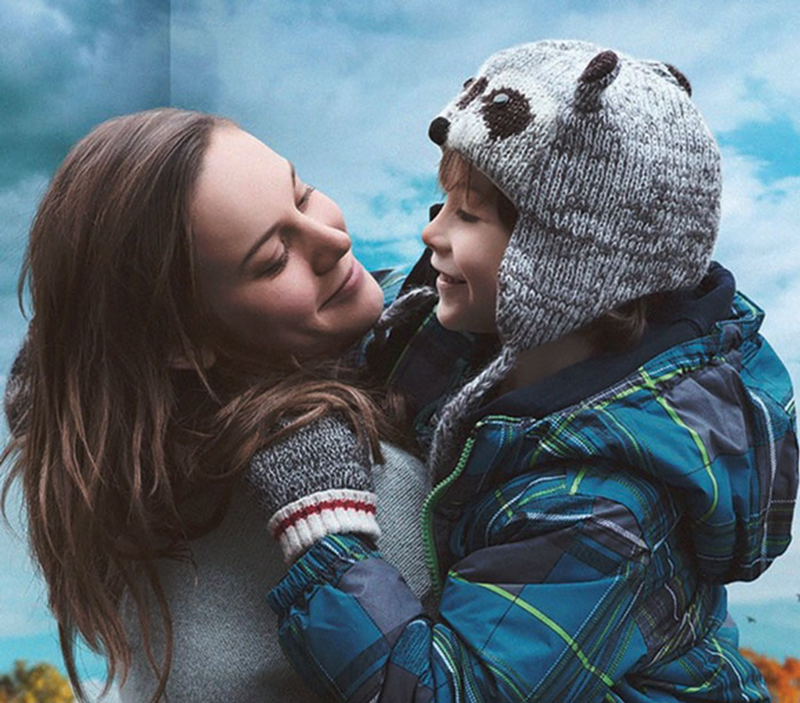We tell ourselves the world is a big place, but director Lenny Abrahamson (Frank), adapting Emma Donoghue’s novel Room, shows us just how infinite the space can truly be. He compacts everything down to one room and presents it from the perspective of young Jack (Jacob Tremblay), a 5-year-old who has been raised in a single room by his Ma (Brie Larson). He has been sheltered from the harshest of realities — things that no 5-year-old should ever know. The somewhat frequent visitor, Old Nick (Sean Bridgers), who drops off supplies to Jacob and Ma, kidnapped Ma seven years ago and impregnated her, which means he is Jacob’s father — a term that means nothing to the boy. Jacob has no sense of the desperate plight he shares with his mother.
What Jacob understands is that this room is his world, and it is a strangely expansive one. He and Ma exercise in it; she fashions a track of sorts for him to expend energy. They eat and sleep and cook and clean in it. There is a tub for bathing. They have a television, which gives him somewhat limited access to the outside, but Ma has taught him that nothing else really matters except for their space. The only tiny exception is the skylight, way up above — that eye to the great beyond, the sky which looms.
And for the first half of the film, we come to believe and appreciate the world that Jacob knows; everything else seems to recede. Well, that’s not entirely true because we, as adults, recognize the ever-present anxiety on Ma’s face. She knows what exists beyond those narrow confines, what was taken from her (on every level) and what she cannot even dare to dream Jacob might one day experience. Calling that expression anxiety doesn’t do it justice. Ma has a barely disguised terror lurking behind her eyes and every false smile that she bravely presents to Jacob.
Larson, gracefully transitioning from quietly intense supporting work (Don Jon) to leading roles (Short Term 12), constantly looks like she’s on the verge of being unable to catch her breath, fearful that she will take her last breath and Jacob will be alone and she will die knowing that she hasn’t prepared him to live on his own.
The real marvel here, though, is Tremblay, who blooms during the second half of the film after Jacob and Ma execute a disorienting and thrilling escape that feels so emotional, honest and real, it does not simply show us what happens. We find ourselves locked in Jacob’s perspective, unable, despite his own precocious nature, to let the new people around him know what is going on. How can he? He is an alien, a stranger in a strange new land.
You could compare Ma and Jacob to astronaut Mark Watney, Matt Damon’s character in The Martian, or similarly Sandra Bullock’s drifting character in Gravity, but Ma and Jacob go from psychological isolation to a sense of being untethered from the world at the exact moment when they (in Ma’s case) reenter it. Jacob’s transition is far more curious, both wonderful and terrifying simultaneously. Watching him go up and down stairs for the first time is akin to capturing man’s first steps on the moon. And initially as he has to wear a mask as protection from a host of germs he hasn’t been exposed to before, we see a physical example of the bubble or cocoon from which he will emerge.
So much of the critical and conventional conversation around Room will key in on the claustrophobia of its first half and the oppressiveness of the initial premise. Yet, what Abrahamson does, to his credit, is strip away the ripped-from-the-headlines feel that could have neutered the film, reducing it to a situational television movie-of-the-week replay.
Instead, he places us inside that cramped space with Ma and Jack (more specifically, inside their psyches), forcing us to accept and appreciate the choices she made as the only available options. We live with them there and are then in position to be truly amazed by Jack’s newfound perspective on the world as well as Ma’s difficult reengagement. (Now playing at Esquire Theatre) Grade: A






